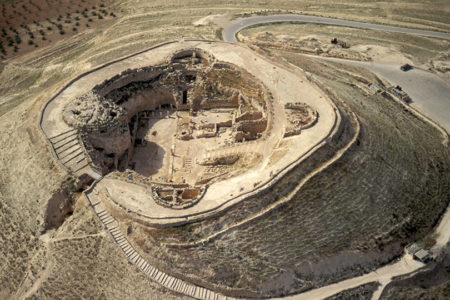Eye on the Middle East Nov/Dec 2006
The late Yasser Arafat and his Palestine Liberation Organization (PLO) cronies made a big mistake years ago when they chose to line their own pockets with the loot garnered from the benevolent West, rather than use it to meet the needs of the Palestinian people.
Coupled with the imposition of poverty were the declaration and execution of an unwinnable war against Israel. All the while, of course, the craggy-faced terrorist blamed Israel and the United States for the misery he heaped on his own people.
Then along came Hamas to take the play away from Fatah, which had led the Palestinian Authority. Hamas stepped in to provide for the Palestinians’ physical and social needs—a tactic as old as the existence of humans on this planet. Bread wins over ideology every time. But Hamas did something else. It invoked the Qur’an and the name of Allah. That was the trump card.
When the PLO was founded in 1964, it never mentioned Allah in its charter, nor did it claim the Qur’an as a guidebook. The 1968 Charter was brought forth as an Arabic, nationalistic document defining the goal of the Palestinians to be the destruction of Israel. By so doing, Arafat and his compadres thought to unify the Arab world around the PLO.
Although a secularist at heart, Arafat played religion as a central part of his platform. Islam was routinely featured, and prominence was given to radical Muslim clerics. Religion became a tool to incite hatred of the Jewish people and Israel, permeating every aspect of the education of Palestinian youth. As the glorification of jihad and suicide bombers took over Palestinian minds, the PLO and Fatah became masterminds of their own demise. By March 2005, polls showed a full 70 percent of Palestinians preferred Islamic Sharia law to those of the Palestinian Authority. In other words, Yasser Arafat had Islamicized the Palestinian people.
On the other hand, Hamas spread Allah and the Qur’an everywhere in its charter. Religion became the driving force behind Hamas’s entry onto the political stage. And its fundamental strategy goes far beyond the destruction of the Jewish state. Its goal is a nonnegotiable commitment for Islam, in the name of Allah, to rule the world.
That fact became clear when, after the Hamas electoral triumph, Ismail Haniyeh was installed as the new Palestinian prime minister. His first act was to wave the Qur’an and shout “Allahu Akhbar” (“Allah is great”), as Hamas legislators cried, “The Qur’an is our constitution, Muhammad is our prophet, jihad is our path, and dying as martyrs for Allah our greatest wish.”
But this kind of fanatical bluster brings its own set of problems. As with their Hezbollah cousins to the north, Hamas terrorists have opened their own can of worms. Their imprudent attack on Israel and the kidnapping of Israeli Cpl. Gilad Shalit brought the wrath of the Israel Defense Forces down on their heads and, unfortunately, on the heads of the Palestinian people. In the short run, the Arabs may idolize the terrorists for their boldness against Israel and the hated Americans; but as the months grind on and they begin to look around, they may see a different side to the story.
It will take billions of Iranian and foreign dollars, and perhaps years, to bring back some semblance of normalcy. In addition, such nations as Egypt, Jordan, and Saudi Arabia are beginning to see Hamas and Hezbollah for what they are: a threat to the stability of the entire Middle East. Add to this mix the reluctance of Arab Christians and moderate Muslims to be ruled by radical Muslim mullahs and Sharia law and, like the PLO before them, these terrorists may be designing the beginnings of their own defeat.






